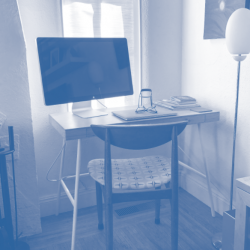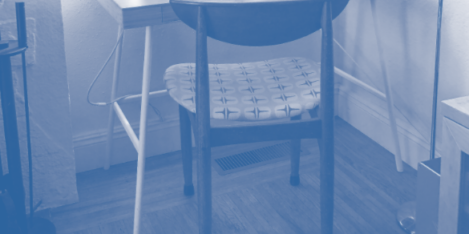December 9, 2020
Search Results for: work-life balance
November 25, 2020
Several factors impact wellbeing of people working from home
by Jayne Smith • News, Wellbeing, Working lives
 A new study on work-life balance claims that the COVID-19 crisis is a crucial factor – but not the only one – behind low levels of wellbeing among employees working from home. A research team including Professor Ilke Inceoglu, Professor of Organisational Behaviour and HR Management at the University of Exeter Business School, analysed data from 835 university employees, who completed a baseline questionnaire on wellbeing and took a weekly survey. (more…)
A new study on work-life balance claims that the COVID-19 crisis is a crucial factor – but not the only one – behind low levels of wellbeing among employees working from home. A research team including Professor Ilke Inceoglu, Professor of Organisational Behaviour and HR Management at the University of Exeter Business School, analysed data from 835 university employees, who completed a baseline questionnaire on wellbeing and took a weekly survey. (more…)
November 23, 2020
The workplace to become more human-centric than ever, as priorities change
by Jayne Smith • Flexible working, News, Working culture, Working lives
 Companies are facing complex performance challenges as the COVID-19 resurgence heightens the need to reinvigorate employee engagement. JLL’s new “Human Experience” report explores these changing workforce dynamics and expectations in a post-pandemic world and offers insights for how forward-thinking companies can reimagine their approach to managing their people and workplaces to stay ahead in 2021. (more…)
Companies are facing complex performance challenges as the COVID-19 resurgence heightens the need to reinvigorate employee engagement. JLL’s new “Human Experience” report explores these changing workforce dynamics and expectations in a post-pandemic world and offers insights for how forward-thinking companies can reimagine their approach to managing their people and workplaces to stay ahead in 2021. (more…)
November 18, 2020
Generation BETA is the latest demographic grouping you need to acknowledge, claims report
by Jayne Smith • News, Technology, Working culture
 GlobalWebIndex (GWI), together with LinkedIn’s B2B Institute, has launched “Work in BETA: The Rising B2B Decision Maker”. The new report sets out to examine the ‘changing behaviours and attitudes of “the BETAs” – the first cohort of digital natives (21 to 40 year-olds) to assume positions of seniority in business, at a time of dislocation’. (more…)
GlobalWebIndex (GWI), together with LinkedIn’s B2B Institute, has launched “Work in BETA: The Rising B2B Decision Maker”. The new report sets out to examine the ‘changing behaviours and attitudes of “the BETAs” – the first cohort of digital natives (21 to 40 year-olds) to assume positions of seniority in business, at a time of dislocation’. (more…)
November 6, 2020
Third of home workers feel disconnected, Leesman data shows
by Neil Franklin • Flexible working, News, Wellbeing
 Insights from Leesman’s ongoing home working study of more than 145,000 workers has revealed that a significant number of employees feel disconnected to their colleagues and organisation, while others struggle to maintain a healthy work-life balance. Over a third of home workers (35 percent) feel disconnected to their organisation when working from home and a further 31 percent feel disconnected to their colleagues, Leesman data has revealed. (more…)
Insights from Leesman’s ongoing home working study of more than 145,000 workers has revealed that a significant number of employees feel disconnected to their colleagues and organisation, while others struggle to maintain a healthy work-life balance. Over a third of home workers (35 percent) feel disconnected to their organisation when working from home and a further 31 percent feel disconnected to their colleagues, Leesman data has revealed. (more…)
November 2, 2020
Workers give over one thousand unpaid hours overtime a year to their employers
by Jayne Smith • Flexible working, News, Working lives
 Millions of Brits give up more than a month of time each year by working additional unpaid hours, totalling five years overtime in their working life, according to new research by Hitachi Personal Finance. In a poll conducted for this year’s National Work Life Week, data suggests how much time Brits are spending working past their contracted hours and what else the nation could be doing with this time. (more…)
Millions of Brits give up more than a month of time each year by working additional unpaid hours, totalling five years overtime in their working life, according to new research by Hitachi Personal Finance. In a poll conducted for this year’s National Work Life Week, data suggests how much time Brits are spending working past their contracted hours and what else the nation could be doing with this time. (more…)
October 30, 2020
Trust from the boss outweighs all other factors for employee happiness
by Jayne Smith • News, Working culture, Working lives

While some organisations have welcomed remote working with open arms, other employers have struggled to trust their employees to work autonomously with some even ramping up on surveillance to track exactly what their workforce is doing. This may however be problematic for organisations looking to attract and retain talent as, according to a recent report from UK-based tech-for-good developer, Culture Shift, almost all (93 percent) of Britain’s workforce say having an employer that trusts them is important for their overall happiness at work. (more…)
October 28, 2020
Millions of workers experience low levels of job satisfaction at work
by Jayne Smith • News, Wellbeing
 A new survey conducted by Just Eat for Business, asked workers about their workplace behaviour, stress levels, mental health and job satisfaction, to get an idea of what Brits’ working lives look like and how they can be improved through a focus on employee wellbeing. The survey claims almost one in ten (8.2 percent) UK employees admit to experiencing quite or very low levels of happiness while at work. (more…)
A new survey conducted by Just Eat for Business, asked workers about their workplace behaviour, stress levels, mental health and job satisfaction, to get an idea of what Brits’ working lives look like and how they can be improved through a focus on employee wellbeing. The survey claims almost one in ten (8.2 percent) UK employees admit to experiencing quite or very low levels of happiness while at work. (more…)
October 28, 2020
Remote working is changing the attitudes of people towards their jobs
by Jayne Smith • News, Wellbeing, Working lives
October 27, 2020
Worker burnout has increased by a third, research claims
by Jayne Smith • News, Wellbeing, Working lives
 According to new data from people success platform Glint, employee burnout is reaching new highs — with no signs of abating. People worldwide have been coping with a range of hardships this year, including a pandemic, social isolation, enforced working from home, school disruptions and major layoffs. (more…)
According to new data from people success platform Glint, employee burnout is reaching new highs — with no signs of abating. People worldwide have been coping with a range of hardships this year, including a pandemic, social isolation, enforced working from home, school disruptions and major layoffs. (more…)
October 20, 2020
One in five working parents treated unfairly since COVID onset
by Jayne Smith • Flexible working, News, Working lives
 Work-life balance charity Working Families has released a new report “Flexistability: Building Back Better for the UK’s Working Families”. The report claims that one in five, or 2.6 million working parents in the UK feel they have been treated less fairly at work because of their childcare responsibilities since the onset of COVID-19. (more…)
Work-life balance charity Working Families has released a new report “Flexistability: Building Back Better for the UK’s Working Families”. The report claims that one in five, or 2.6 million working parents in the UK feel they have been treated less fairly at work because of their childcare responsibilities since the onset of COVID-19. (more…)






 Heightened anxiety during the Covid-19 pandemic has led to employees working longer hours and taking fewer sick days, all the while becoming less fulfilled by work and life, according to the latest analysis from
Heightened anxiety during the Covid-19 pandemic has led to employees working longer hours and taking fewer sick days, all the while becoming less fulfilled by work and life, according to the latest analysis from 


















November 11, 2020
UK office design should look to Europe for inspiration
by Ollie Plastow • Comment, Workplace design